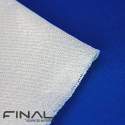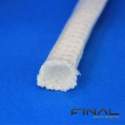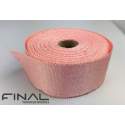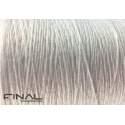Ceramic Fibre
Final Advanced Materials offers a full range of products in various forms of ceramic fibre: tapes, threads, sleeves, fabrics, etc.
What are Ceramic Fibres?
Final Advanced Materials can supply an innovative continuous polycrystalline ceramic fibre. The metallic oxides at the heart of its composition ensure that the processing of this fibre into ceramic textiles is particularly simple. It is mainly used in the aerospace, automotive, electrical and petrochemical industries.
This fibre also has a very low elongation and shrinkage rate thanks to its application temperature. As a result, manufacture is dimensionally stable. This continuous fibre demonstrates a mechanical and thermal performance that fibrous materials do not achieve, such as aramid, silica or glass fibres. In addition, this fibre has excellent chemical resistance, excellent dielectric strength, low thermal conductivity, good thermal shock resistance and low porosity.
General Characteristics of Ceramic Fibres
Physical and Mechanical Characteristics
Monofilament ceramic fibres are characterised by excellent dimensional stability thanks to their low shrinkage and elongation rate.
|
Property |
Unit |
Ceramic 1,100 °C |
Ceramic 1,370 °C |
|
Tensile Strength |
MPa |
1,630 |
1,840 |
|
Tensile Modulus |
GPa |
150 |
190 |
|
Shrinkage |
% |
< 1.5 |
< 0.5 |
|
Weight Loss |
% |
2.6 |
0.1 |
Moisture Uptake
Moisture absorption of monofilament ceramic fibres is extremely low. Thanks to their nonporous surface, the fibres are able to retain a maximum of 0.08 % of their weight in water.
Thermal Properties
Monofilament ceramic fibres have low conductivity and excellent resistance to high temperatures, making them an incomparable thermal insulator.
|
Property |
Unit |
Ceramic 1,100 °C |
Ceramic 1,370 °C |
|
Max. Operating Temperature |
°C |
1,100 |
1,370 |
|
Peak Temperature |
°C |
1,700 |
1,700 |
|
Thermal Conductivity |
W.m-1.K-1 |
0.10 |
0.12 |
|
Thermal Conductivity |
W.m-1.K-1 |
0.14 |
0.16 |
|
Thermal Conductivity |
W.m-1.K-1 |
0.18 |
0.19 |
Benefits of Ceramic Fibres
- Low elongation rate
- Low shrinkage
- Excellent chemical resistance
- Excellent dielectric strength
- Low thermal conductivity
- Excellent resistance to thermal shock
- Low porosity
Comparison
|
Property |
Unit |
E-Glas |
Silicium | Ceramic |
|
Peak Temperature |
°C |
600 |
1,100 |
1,700 |
|
Density |
g/cm3 |
2.6 |
2.2 |
3.05 |
|
Thermal Conductivity |
W.m-1.K-1 |
0.85 to 1 |
1.38 |
|
|
Dielectric Constant |
6.4 |
3.7 |
5.7 |
Applications of Ceramic Fibres
- Thermal shield
- Fire barrier
- Thermal insulation
- Electrical insulation
- Composite reinforcement
- Sealing and insulation
Ceramic Fibres Products
Threads
Composed mainly of alumina (Al2O3) at different percentages, ceramic threads withstand operating temperatures up to 1,400 °C. They are primarily designed for thermal, electrical and mechanical applications subjected to extreme conditions, such as the manufacture of fire safety equipment and electrical or chemical insulators. Thanks to their great resistance to abrasion and mechanical stress, they are particularly suitable for sewing.
Sleeves
Ceramic sleeves can withstand operating temperatures up to 1,400 °C and peak temperatures up to 1,500 °C. They are particularly suitable for the insulation and the protection of cables, tubes, pipes and thermocouples. Final Advanced Materials proposes untreated ceramic fibre sleeves or with a heat cleaned finish. This treatment limits irritations during handling, the amount of smoke produced during exposure to high temperatures and airborne fibres.
Tapes
Ceramic tapes are resistant to applications involving operating temperatures up to 1,250 °C and peak temperatures up to 1,350 °C. They are particularly suitable for the thermal and electrical insulation as well as the protection of cables, tubes and pipes and the strenghtening packaged products. A heat treated or a heat cleaned finish is available: they can limit irritations for customised applications as well as flying fibres and the amount of smoke produced during exposure to high temperatures. They also prevent the physical degradation of the ceramic fibre.
Fabrics
Ceramic fabrics can withstand operating temperatures up to 1,400 °C and peak temperatures up to 2,000 °C. They are mainly used in the industry as heat shield and fire shield. The ceramic fabrics proposed by Final Advanced Materials are provided untreated. A version with a heat cleaned or heat treated finish is also possible. These treatments limit the irritations for customised application, the amount of smoke produced during exposure to high temperatures and minimise airborne fibres. They also prevent the physical degradation of the ceramic fibre when the products are subjected to hot and humid conditions for an extended period.
Felts
The ceramic fibre felts proposed by Final Avanced Materials are mainly made of alumina (Al2O3) at different proportions. They can withstand classification temperatures up to 1,650 °C depending on their composition. These felts are used in the industry for high-temperature applications thanks to their excellent thermal resistivity, including the manufacture of calcining kilns for porcelain or thermal shield. The ceramic fibre felts are available with a thickness of 13 or 25 mm.
Papers
The ceramic fibre papers provided by Final Advanced Materials are mainly made of alumina (Al2O3) at different proportions and offer excellent chemical resistance. Depending on their composition, they can withstand classification temperatures up to 1,650 °C. These papers are used in the industry for the manufacture of expansion joints, sealing joints or thermal shield. The ceramic fibre papers are available with a thickness ranging from 1 to 3 mm and in widths of 550 mm.
Physical variables included in this documentation are provided by way of indication only and do not, under any circumstances, constitute a contractual undertaking. Please contact our technical service if you require any additional information.






